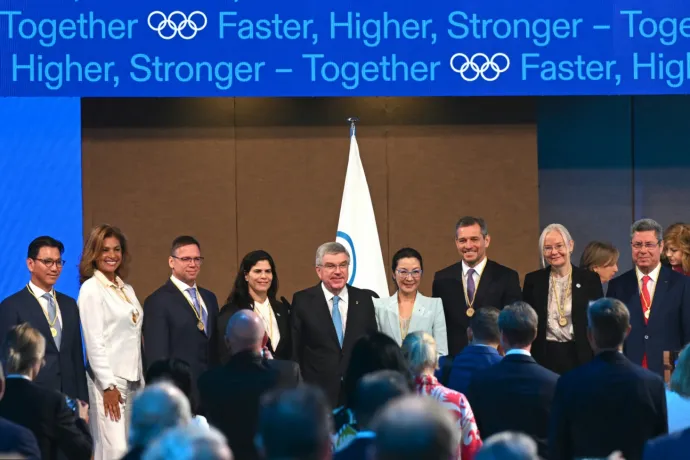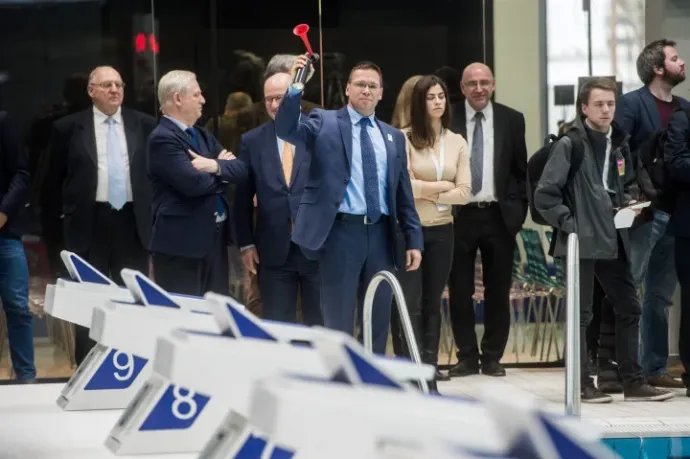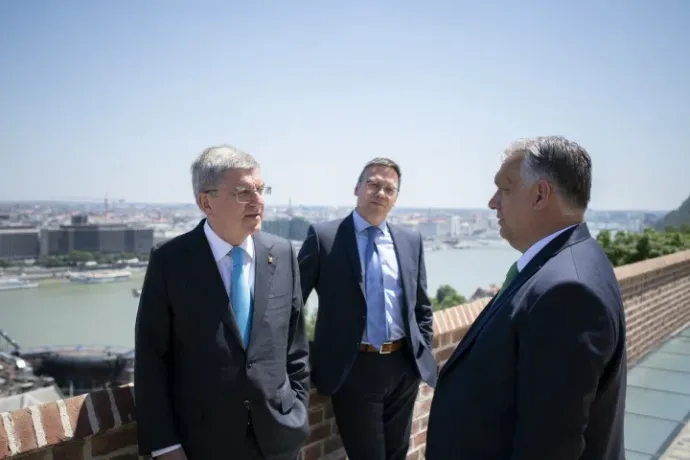
Balázs Fürjes has been elected as a member of the International Olympic Committee (IOC). At its meeting in Mumbai, the organisation's General Assembly elected him for the post on Tuesday, as proposed by the Executive Committee in September.
"Glory to God alone," Fürjes wrote on Facebook, where he also shared that he was elected with 92 percent of the votes. “This recognition and trust belongs to Hungary, Hungarian sport and the Hungarian Olympic movement.”
While there’s been a clear tendency to separate sport and politics, as evidenced by the successive departures of politicians from the helm of sports federations, Hungary has now delegated a politician to the International Olympic Committee (IOC). The permanent members, of which Fürjes is now one, have a fixed term of office, meaning that they can continue to hold the post until the age of 70, which in his case is another 19 years.
Along with Fürjes, the IOC elected Peruvian volleyball legend and Olympic silver medalist Cecilia Villacorta, who has also tried her hand at politics; Israel's European judo champion Yael Arad; and Oscar-winning actress Michelle Yeoh, representing Malaysia. Germany's Michael Mronz was also elected to the panel. Similarly to Fürjes, he also lacks a distinguished sporting background, and is mainly known as a businessman who has organised tennis tournaments and was the partner of former Foreign Minister Guido Westerwelle.
Fürjes, the frontrunner
Even at its 1894 founding, the IOC already had a Hungarian member: Ferenc Kemény, a friend of the French Baron Pierre de Coubertin. Apart from a three-year period between 1961 and 1964, Hungary was always represented in the organisation, for example between 1939 and 1948 by Miklós Horthy Jr. Pál Schmitt began representing Hungary in the organisation in 1983, but as he turned 80 in 2022 (which was the age limit applicable to him), he was reclassified as an honorary member. This means that he can still participate in the organisation's meetings, but has lost his right to vote.
The infighting for who would become Schmitt's successor had already started last year. At first, Zsolt Gyulay, president of the Hungarian Olympic Committee (MOB), seemed to be the frontrunner, but given that he also manages Hungaroring, he was not really interested in the job, although he obviously would not have objected had he been chosen. During his last visit to Hungary last June, when meeting with Prime Minister Viktor Orbán, IOC President Thomas Bach requested that
Hungary preferably nominate a woman and not a politician.
It was not Bach's first visit to Hungary, the Prime Minister even gave him a grand tour of the football academy in Felcsút (the village the PM grew up in, and where a football academy was established in 2005). Following his request, even the name of current President Katalin Novák came up, as well as that of three-time Olympic champion Katinka Hosszú. Although olympic champion swimmer Dániel Gyurta has been a member of the IOC Athletes' Commission for eight years, there was no realistic chance of him being nominated for the position. Sabre fencer Áron Szilágyi will also join the eight-member Athletes' Committee when he's elected in 2024. The scene finally cleared in January this year, and Balázs Fürjes, who has always aspired to get ahead in the world of sport, became the front-runner.
Following an extraordinary meeting, the Hungarian Olympic Committee (MOB) announced its support for Balázs Fürjes' candidacy, after which he resigned from his government post in March. Until then, he was deputy to Gergely Gulyás, Minister of the Prime Minister's Office, with whom he still has a good relationship. (By the way, Fürjes continues to use his email address connected to the Prime Minister's Office to this day.)
Fidesz politicians linked to sport are of the opinion that Orbán believes that there is no better person than Fürjes to win the 2036 Olympic bid for Hungary. And, of course, he also knows that Fürjes will always remain loyal to him, because he put him in this position. Thus, in political terms, Orbán has positioned himself directly in the bloodstream of international sport. This is not without precedent though, as he has long been in this particular bloodstream in football, by virtue of the Puskás Academy, and has even hosted FIFA President Sepp Blatter for this reason.
He joined Fidesz while still in high school
Fürjes became a member of the then liberal Fidesz' electoral committee when he was still in high school, in 1990, and held this position for two years. This makes it clear that his relationship with Orbán spans decades. In the high school he attended, he founded a pro-Fidesz group as early as 1988.
After graduating from law school and passing his exams in 1999, he became chief of staff to Tamás Deutsch, whom he knew well from the party, and who had become Sports Minister at the time. At the end of 1999, the Budapest Sports Hall burned down and its reconstruction became a high priority for the government. Fürjes became responsible for this as a government commissioner. Given that his knowledge of sport was superficial, and his sometimes demanding style was not found to be very endearing within the ministry, his departure was mutually welcomed.
Remembering that period in 2011, Ákos Topolánszky described Fürjes as:
"A technocrat dedicated to his country".
When the idea of Hungary hosting the Olympics was first raised in 2002 and Fidesz started collecting signatures in support of the project, Fürjes became the project's ministerial commissioner. Since Fidesz lost the 2002 elections and the new sports hall was not inaugurated until 2003, the MSZP government still employed him for a few months, but he was not invited to the handover ceremony, even though he had put a lot of work into it, from the planning through the entire construction of the project.
After the unexpected election debacle, he went into the private sector, working for the Wallis Group, a company linked to (former PM) Gordon Bajnai, and worked in real estate and property development. The Papp László Sports Arena was the reference for him at Wing, and it was this that attracted interest in him. He was brought back into political circles in 2011, and Orbán entrusted him with large-scale development projects as government commissioner. It was then that it surfaced that one of his ancestors was Sarah Arturn, the niece of one of the Scottish engineers who came to Hungary to build the Chain Bridge. She married Pál Török, the later Reformed bishop, Fürjes' great-great-grandfather.

Several structures for which he was responsible have been completed since 2012.. One of them was the Duna Aréna, which the visual plans presented as an imposing building, and which indeed meets all requirements on the inside, but its outside – to put it mildly – did not add to the Budapest skyline: it's a gray building reminiscent of a car park. What's more, its cost kept on increasing week by week. Fürjes learnt a lot from this, the Puskás Aréna stadium and the MVM Dome turned out considerably better aesthetically, and there were no articles to be written about the constantly rising costs either. Among his non-sports-related projects, he is particularly proud of the construction of the Ludovika University of Public Service.
After the big projects started to wind down, he turned to politics, but was defeated in the 2022 elections in the 12th district of Budapest, which was previously held by Fidesz. This prevented him from entering local and national politics, and as a result of the failure, he turned his attention back to sports diplomacy, where he made giant strides to arrive at his current mandate. If there was even a notion in Fidesz that he might eventually become a candidate for mayor, losing his constituency quickly killed it.
In 2019, after the public television channel aired a memorable interview with Budapest mayor Gergely Karácsony, Fürjes called the public station out (he called the interview unacceptable). Opinions are divided as to whether he was allowed to do this or whether he was later told off by Antal Rogán.
Why is it good to be a member of the IOC?
Primarily for the prestige. In certain circles, the five hoops look really good on a business card, and there aren't many such business cards in the world: at the moment, the IOC has less than 100 members.
There is no monthly salary for the job – although, a clarification is due here, because whenever IOC members represent the body anywhere in the world, they can expect a daily rate of $450 (which goes up gradually.) Since Fürjes is involved in the preparations for the 2032 Olympics in Australia, this often means $450 a day. To bring a specific example: if Fürjes were to appear in the VIP section of the Duna Arena in Budapest at the 2027 World Aquatics Championships as a member of the IOC, he would receive this amount.
In addition to the generous payment, current IOC members can only travel in first class, and especially on intercontinental flights, they are not allowed to be seated elsewhere. This is the most expensive section aboard, tickets are at least ten times more expensive than the average economy ticket.
Additionally, while the Olympics are going on, Fürjes will have 24-hour chauffeur service, he will be allowed to enter wherever he wants, and if a Hungarian delegation arrives, doors remain closed to others will be wide open for him.
Schmitt vs Fürjes
The start of Pál Schmitt's IOC career was completely different, because he started moving up the ladder as an Olympic champion (the only slight similarity being that he was also elected in India forty years ago). And of course, IOC President Samaranch was also there to help his progress. In 1983, Schmitt accompanied Samaranch to the inauguration ceremony of the Budapest Sports Hall, not least because he spoke Spanish.
Between 1995 and 1999, Schmitt was the organisation's first vice-president and later became its Chief of Protocol, the highest position any Hungarian diplomat has ever achieved. In 2002, he ran for the IOC presidency, but lost. Schmitt's reception was also very different in the body, because he came from the socialist bloc, spoke foreign languages, was a good orator, and had a charm that very few people possessed at the time. Fürjes is not a very good orator. At one of the sports galas held at the National Theatre, he began by saying that a good speech is one that is short and funny, and then proceeded to give a long and humourless speech.
Additionally, Fürjes is a divisive individual. He pushes his way forward, he elbows, and he knows no compromise, our sources said. They also recalled that during Zsolt Borkai's presidency (2010-2017) of the Hungarian Olympic Committee (MOB), as head of the Olympic bid, Fürjes had imposed his authority on the MOB, narrowing its powers. It is a fact indeed that there was a Hungarian House in Rio in an elegant part of the city, where the MOB leaders were only guests, because the team responsible for the Budapest bid was renting it, and they even hosted Orbán there in the final days of the games, prior to Hungary's national holiday on 20 August.
“If I get an email at 5am, it's almost certainly from Balázs. His work ethic is that of a top athlete.”
– one insider praised him, saying that the pace at which he works is truly unique, as is his discipline. It has also happened that he directed a close colleague to meet him at the airport at 4 a.m., so that they could go over the next few days' tasks before he took off on the 6 a.m. flight.
My own firsthand experience about his communication and work pace is from the time when the Duna Aréna was completed, but only the government press was shown around. I wrote to him to say that I would have liked to see it too. He called me and within a few days I was given a tour of the facility by Olympic champion Katinka Hosszú, which I wrote about at our former workplace, Index.
Humiliation vs. a rational choice
There are two positions in the Hungarian sporting world regarding his election. According to the first, it has been a long time since Hungarian sport has been so humiliated, because it was not an insider who was given this retiree position. An athlete would have had an advantage in the IOC because they are already familiar with the players, after all they come from the same world. Besides, Fürjes has already failed in the international governing body of World Aquatics (WA) (he handed his board membership to Sándor Wladár), while Péter Szijjártó made an agreement with the Kuwaiti president of WA, Hussein just this past summer that they would move to Budapest in the next few years.
The other side argues that his advocacy skills and his strong relationship of trust with Orbán are more important than anything else. They add that not everyone in the IOC is an athlete, the organisation integrates many areas and it is more important to have the right English skills and efficiency, of which Fürjes is a prime example. Moreover, he was present at many international sports events held in Hungary, and as one of the main organisers, has received the arriving delegations several times. Other than only the aforementioned Bach, he also welcomed the President of the World Athletics Federation, Sebastian Coe. (And if his interests so required, he had the original seating plan changed so that he could be next to him in the VIP area at the World Championships.)

At the same time, Hungary's push to host sporting events has already been known to provoke some mild revulsion around the world. In Hungary, the push is sold by saying that Budapest is the capital of sport. Abroad, however, it's sometimes considered irritating that Budapest, like Kazan and Baku, wants it all and is willing to sacrifice to have it all. When Los Angeles stepped back from hosting the World Urban Games (the most important event in street sports) and Budapest took over, some sports diplomats nicknamed the event the Orban Games. The fact that the Hungarian capital was able to host the event in 2019 is another of Fürjes' unquestionable achievements.
As Fürjes does not have a sporting background, he will undoubtedly be a stranger to these circles for a while, although he was flattered to be introduced as the head of the Budapest bid at the 2016 Rio Olympics, and it was then that he began to build his network. Later, however, they let that bid die because Fidesz refused to hold a referendum about hosting the Olympics, even though (the opposition party) Momentum had gathered enough signatures to do so.
The mission: 2036
When Fürjes' IOC candidacy became official in March, it was not yet known which nations would aspire to host the 2036 Olympics. We have since learned that the Poles are also interested in hosting the event, especially as they hosted a much smaller, but also IOC event (European Games) in the Krakow area this year. Indonesia and India are also considering a bid, hosting the current IOC meeting is actually a prelude to this.
While new sport venues have mushroomed in Hungary in recent years, the railway connecting the airport to the city still isn't finished, and while this may not make a bid frivolous, it certainly isn't an advantage. We have previously written about the low number of hotel rooms available in the city being a noticeable handicap, on top of the size of the airport. Even in Rio, there are complaints about the hotels that were built for the Olympics being under-utilised.
Many say that Budapest is not the right size, so the Olympics are no more than a dream. Others argue that if there were a consensus among the population, and if it were not sports facilities that were built, but developments that would make the capital more liveable and attractive, such as the airport railway or the connection of the suburban railway lines, then Budapest might actually have a chance (It was just recently that due to lack of money, János Lázár cut the funding previously intended for the suburban railway lines.)
Involving other countries might be an answer to concerns over the size of the city. With Paris hosting the surfing events 16,000 kilometres from home in 2024, the IOC would almost certainly be lenient if, in addition to Hungarian cities, Slovakia were to get involved, even just to host the canoe slalom events, or Vienna could get a football or rugby match.
The IOC seems to have recognized that the old bidding concept is outdated, and that each withdrawal only contributes to the depreciation of the games. Therefore, it favours cities selected after background discussions. It is these meetings that Fürjes needs to organise well, he needs to be the driving force behind the lobbying. Then, of course, the state of the Hungarian economy is another matter, but 2036 is a long way off, even Orbán has only made plans up to 2034.
The 51-year-old Fürjes, however, has already been elected and can now begin his work. He will go at it with vehemence, of that we can be sure. Hungarians in the world of sport can begin to reconcile themselves to the idea that he will be an unavoidable figure in both minor and major affairs for another 19 years, whether they like his style or not.
For more quick, accurate and impartial news from and about Hungary, subscribe to the Telex English newsletter!